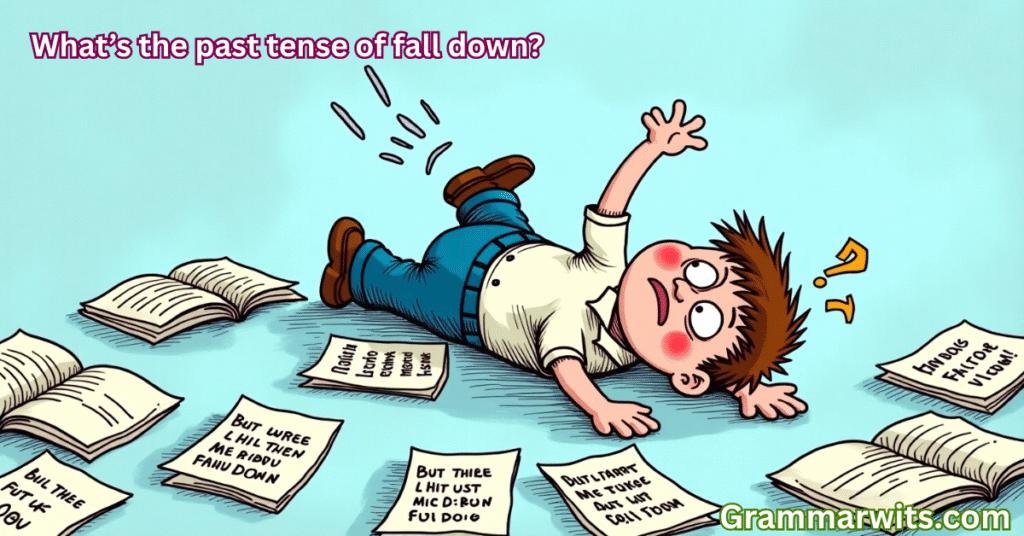The past tense of “fall down“ is “fell down.” This form is used when describing an action that happened in the past involving a person or object descending unintentionally from a higher position to a lower one. Since “fall” is an irregular verb, it doesn’t follow the standard “-ed” rule. Instead, the verb changes entirely, making “fell down” the correct usage when referring to events that have already occurred.
Grammar can feel intimidating, but learning small things—like how to use “fell down” properly—makes everyday English sound more natural and confident. Whether you’re writing a story, chatting with friends, or helping a child learn to speak better, knowing how to switch verb tenses makes a big difference. This little grammar gem can sharpen your communication instantly.
Mastering the past tense of fall down will not only boost your writing clarity but also enhance your speaking fluency. From storytelling to classroom use, this phrase shows up often in real life.
Direct Answer: The Past Tense Revealed
The past tense of fall down is “fell down” – never “falled down.” This follows the irregular verb pattern of the base verb “fall.”
Here’s why this matters for English grammar: “Fall” doesn’t follow regular verb tense rules where you simply add “-ed.” Instead, it transforms completely:
- Present: fall down / falls down
- Past: fell down
- Past participle: fallen down
The irregular verb fall behaves this way because of its ancient linguistic roots. When you combine “fall” with the particle “down,” the entire phrasal verb follows the same grammatical patterns as its base verb.
Think of it like this: if “fall” becomes “fell,” then “fall down” naturally becomes “fell down.” The particle “down” doesn’t change the core verb conjugation – it just adds directional meaning to the action.
Many students incorrectly assume all verbs follow regular patterns. However, irregular verbs in English like “fall” require memorization. The good news? Once you learn “fell,” you’ll automatically know the past tense of fall down.
Understanding “Fall Down” as a Phrasal Verb
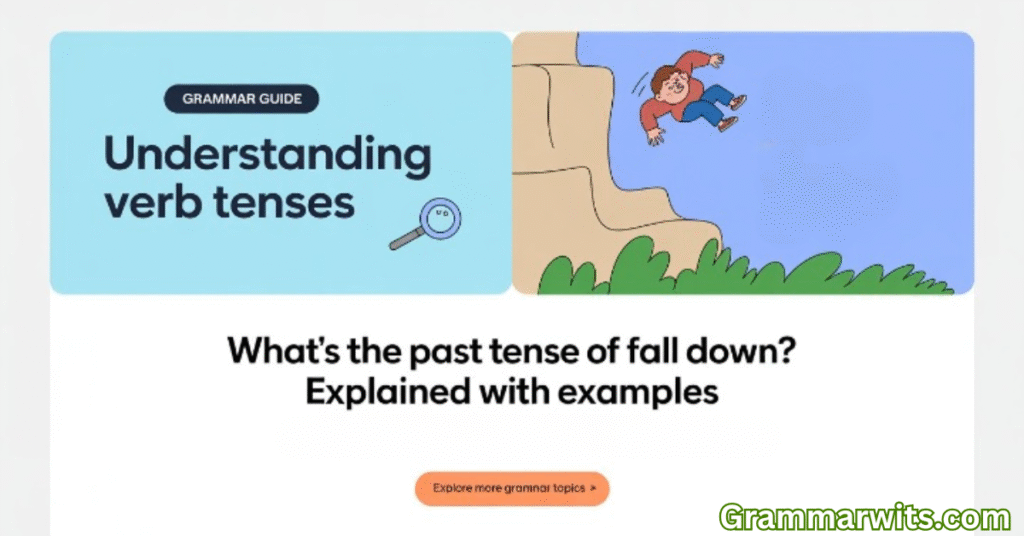
Fall down represents a specific type of phrasal verb that combines an action verb with a directional particle. This combination creates semantic meaning beyond what either word accomplishes alone.
When we examine phrase meaning, “fall” by itself suggests losing balance or dropping. Adding “down” specifies the direction of movement. Compare these examples:
- “The apple fell” (general dropping motion)
- “The apple fell down” (specifically downward motion)
Phrasal verbs like this one create challenges because they don’t always follow predictable grammatical patterns. The particle “down” stays attached to the verb through all tense changes, maintaining the unit’s contextual examples and meaning.
Linguistic usage studies show that phrasal verbs express more specific actions than simple verbs. “Fall down” implies a complete descent, often suggesting the subject ended up on the ground or floor. This lexical semantics distinction helps explain why English speakers choose this construction over simpler alternatives.
The word formation process here involves combining a motion verb with a directional adverb. This creates what linguists call an “inseparable phrasal verb” – you cannot place objects between “fall” and “down” like you might with other phrasal verb combinations.
Complete Conjugation Breakdown
Understanding verb conjugation requires seeing all tense forms together. Here’s the complete tense table for “fall down”:
| Tense | Form | Example |
|---|---|---|
| Present | fall down / falls down | “Children fall down while learning to walk” |
| Past | fell down | “She fell down the stairs yesterday” |
| Future | will fall down | “The old tree will fall down in the storm” |
| Present Perfect | have/has fallen down | “The building has fallen down completely” |
| Past Perfect | had fallen down | “The wall had fallen down before we arrived” |
| Future Perfect | will have fallen down | “By tomorrow, the structure will have fallen down” |
This English grammar pattern shows how irregular verbs maintain their irregularity across all tenses. Notice that the past tense of fall down remains “fell down” regardless of the subject.
Verb forms like these require practice because they don’t follow the standard “-ed” pattern most English verbs use. The conjugation of fall stays consistent whether used alone or within phrasal verbs.
Grammar rules dictate that particles like “down” don’t affect the core verb’s conjugation. This principle applies to other irregular verbs in English combined with particles: “break down” becomes “broke down,” not “breaked down.”
Real-World Usage: Context Matters
Present Tense Examples in Action
Present tense usage of “fall down” appears frequently in everyday sentence structure. Here are contextual examples showing different applications:
Physical Actions:
- “Toddlers fall down repeatedly while mastering balance”
- “Skaters sometimes fall down during difficult jumps”
- “Older people fall down more often due to mobility issues”
Metaphorical Usage:
- “Business plans fall down without proper research”
- “Arguments fall down when based on false premises”
- “Systems fall down under excessive pressure”
Instructional Context:
- “Students fall down when they skip foundational concepts”
- “Athletes fall down if they neglect training basics”
The present tense form works for habitual actions, general truths, and ongoing situations. Grammar for kids often starts with these concrete, observable examples before introducing more complex tenses.
Past Tense Examples That Stick
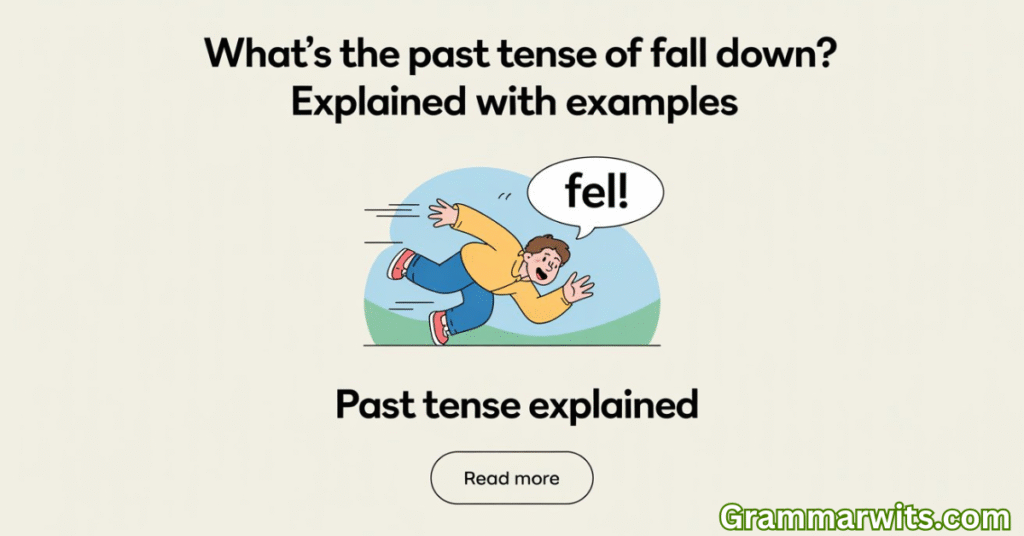
The past tense of fall down – “fell down” – appears in storytelling, news reports, and personal narratives. These examples of fall down in a sentence demonstrate proper usage:
Narrative Storytelling:
- “Jack fell down the hill after Jill”
- “The knight fell down when his horse stumbled”
- “She fell down laughing at the comedian’s joke”
News Reporting:
- “The bridge fell down during the earthquake”
- “Several trees fell down in yesterday’s windstorm”
- “The old barn fell down after years of neglect”
Personal Experiences:
- “I fell down the stairs carrying laundry”
- “My grandmother fell down in her garden”
- “The child fell down and scraped his knee”
Each example shows how the past tense of fall down creates clear, specific narratives about completed actions.
Common Mistakes You’ll Want to Avoid
Many learners struggle with irregular verb fall patterns, leading to predictable errors. The most frequent mistake involves creating “falled down” instead of the correct “fell down.”
Why “Falled” Never Works:
“Fall” belongs to a group of irregular verbs in English that completely change form rather than adding standard endings. Consider these similar patterns:
- Run → ran (not “runned”)
- Sing → sang (not “singed”)
- Fall → fell (not “falled”)
Regional Confusion:
Some dialects might use non-standard forms, but standard English grammar requires “fell down” universally. Grammar rules don’t change based on location when dealing with irregular verbs.
Formality Levels:
Both formal and informal linguistic usage accept “fell down” equally. The phrasal verb works in academic writing, casual conversation, and professional communication without adjustment.
Particle Placement:
Unlike separable phrasal verbs, you cannot split “fall down.” Saying “fell the stairs down” is incorrect – the proper form keeps the particle attached: “fell down the stairs.”
Understanding these grammatical patterns prevents common errors and builds confidence in verb usage.
Powerful Alternatives: Synonyms That Enhance Your Writing
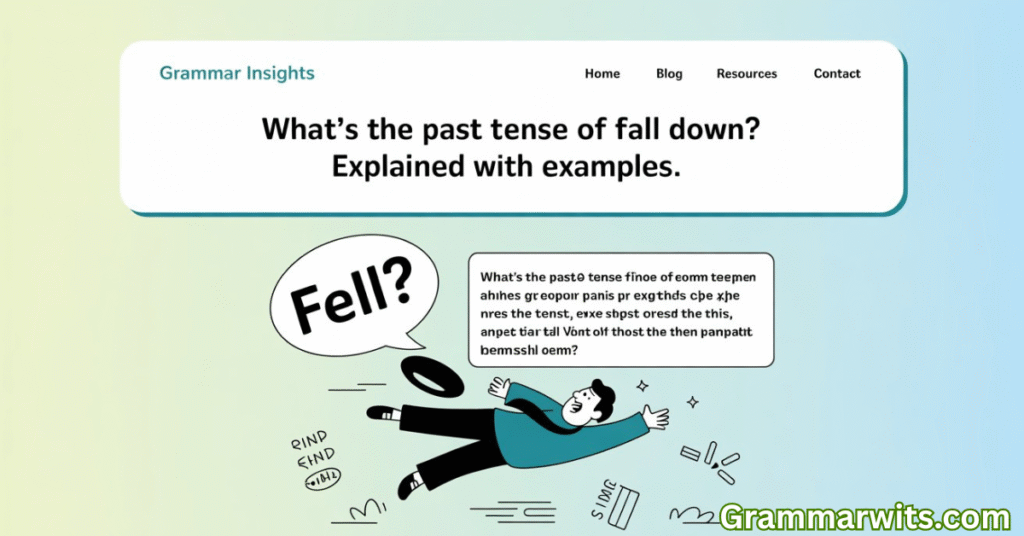
Present Tense Alternatives
Fall down synonyms provide variety and precision in your writing. Different words carry subtly different semantic meaning:
Accidental Falls:
- Tumble (suggests rolling motion)
- Trip (implies catching on something)
- Stumble (indicates losing balance)
- Slip (suggests smooth surfaces)
Structural Collapses:
- Collapse (complete structural failure)
- Crumble (gradual deterioration)
- Topple (tipping over from upright position)
Deliberate Actions:
- Drop (intentional release)
- Descend (controlled downward movement)
Contextual Examples showing how to use fell alternatives:
- “The gymnast might tumble during her routine”
- “Hikers often stumble on rocky paths”
- “Old buildings collapse without maintenance”
Past Tense Alternatives
When you need examples of fall and fell alternatives, these past tense options work effectively:
Physical Movement:
- Tumbled – “She tumbled down the hill”
- Tripped – “He tripped over the rope”
- Slipped – “The dancer slipped on the wet floor”
Structural Changes:
- Collapsed – “The roof collapsed under snow weight”
- Toppled – “The statue toppled in the wind”
- Crumbled – “The ancient wall crumbled completely”
These alternatives help avoid repetition while maintaining clear contextual examples of downward movement or structural failure.
Etymology Deep Dive: Where “Fall Down” Originated
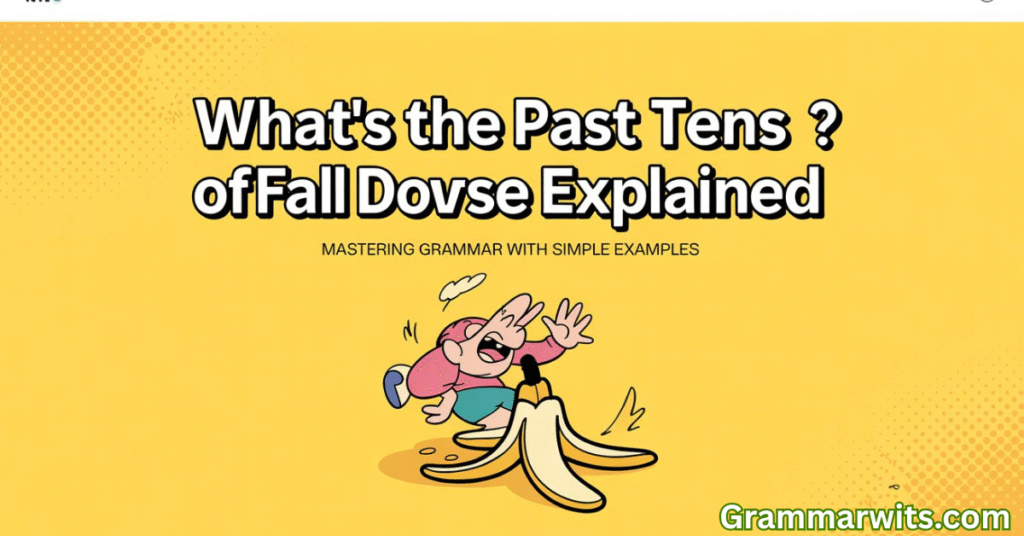
Language evolution shows fascinating patterns in how phrasal verbs developed. The etymology of “fall down” traces back to Old English roots.
Historical Development:
The base verb “fall” comes from Old English “feallan,” meaning “to drop from a height.” Germanic languages share this root, showing its ancient origins. Word formation patterns from this period established many irregular verbs in English.
Particle Addition:
Medieval English speakers began adding directional particles to verbs for precision. “Down” (from Old English “dūne”) specified direction more clearly than “fall” alone. This linguistic usage pattern created thousands of modern phrasal verbs.
Modern Standardization:
By Shakespeare’s time, “fell down” appeared regularly in literature. The past tense of fall down became standardized through printing and education, establishing the grammar rules we follow today.
Cross-Language Influence:
Norman French influenced English syntax patterns, but core irregular verbs like “fall” maintained their Germanic conjugations. This explains why English grammar contains mixed patterns from different linguistic traditions.
Understanding etymology helps explain why irregular verb fall patterns exist and why memorizing them remains necessary for proper verb conjugation.
Advanced Grammar: Phrasal Verb Patterns
Phrasal verbs follow specific grammatical patterns that distinguish them from simple action verbs. “Fall down” represents an inseparable type where the particle cannot move.
Separable vs. Inseparable:
Some phrasal verbs allow object insertion:
- “Pick up the book” OR “Pick the book up”
However, “fall down” never separates:
- “Fell down the stairs” (correct)
- “Fell the stairs down” (incorrect)
Professional Writing Considerations:
Academic and business writing sometimes prefers single-word alternatives to phrasal verbs. Consider these formal substitutions:
| Phrasal Verb | Formal Alternative |
|---|---|
| fall down | collapse, descend |
| break down | malfunction, analyze |
| set up | establish, arrange |
Verb Usage in different contexts requires understanding these linguistic usage patterns. The past tense of fall down works appropriately across all formality levels, but alternatives might sound more sophisticated in certain situations.
Tense Consistency:
When using phrasal verbs in complex sentences, maintain consistent verb tense rules. Mixed tenses create confusion:
- Incorrect: “She falls down yesterday”
- Correct: “She fell down yesterday”
Quick Reference Guide
This grammar lesson summary provides essential information about the past tense of fall down:
Core Rule:
- Present: fall down / falls down
- Past: fell down
- Past Participle: fallen down
Memory Device:
- Fall → Fell (same pattern for “fall down” → “fell down“)
Common Contexts:
- Accidents and injuries
- Structural collapses
- Metaphorical failures
- Storytelling and narratives
Usage Tips:
- Never use “falled down”
- Keep particle “down” attached
- Works in all formality levels
- Follows irregular verb patterns
Quick Check:
- If describing yesterday’s action, use “fell down“
- If describing habits or general truths, use “fall down”
- If predicting future events, use “will fall down”
This verb conjugation chart covers the most essential patterns for mastering the past tense of fall down.
Conclusion: Master This Grammar Point
You’ve now mastered the past tense of fall down completely! Remember that “fell down” is always correct, never “falled down.” This irregular verb pattern applies consistently across all contexts and formality levels.
The key insights from this grammar lesson include understanding phrasal verb behavior, recognizing irregular verb fall patterns, and applying proper verb conjugation rules. Whether you’re helping with grammar for kids or improving your own skills, these principles create confident, correct usage.
Practice using “fell down” in your daily conversations and writing. The more you apply these grammar rules, the more natural proper verb usage becomes. Remember that English grammar rewards consistency and memorization with irregular verbs.
Keep exploring linguistic usage patterns to strengthen your overall language skills. The past tense of fall down represents just one example of English’s rich grammatical patterns and fascinating language evolution.
Frequently Asked Questions
Q1: Is “falled down” ever correct in English?
No, “falled down” is never correct in standard English grammar. The verb “fall” is an irregular verb that changes to “fell” in the past tense. Since fall down is a phrasal verb built on “fall,” its past tense becomes “fell down,” not “falled down.”
Q2: What’s the difference between “fell” and “fell down”?
“Fell” and “fell down” have subtle but important semantic meaning differences. “Fell” by itself suggests general dropping or losing balance, while “fell down” specifically indicates downward movement to a lower position. For example, “The glass fell” could mean it dropped in any direction, but “The glass fell down” clearly shows downward motion.
Q3: Can you say “fallen down” without a helping verb?
No, “fallen down” requires a helping verb in standard English grammar. “Fallen” is the past participle form, which needs auxiliary verbs like “have,” “has,” or “had” to create complete verb forms. Correct usage includes “has fallen down,” “have fallen down,” or “had fallen down.” Using “fallen down” alone creates incomplete sentence structure.
Q4: Do British and American English treat “fall down” differently?
Both British and American English use identical grammar rules for the past tense of fall down. “Fell down” is correct in both dialects, with no variation in verb conjugation patterns. While some vocabulary differences exist between British and American English, irregular verb forms remain consistent.
Q5: How do you use “fall down” in questions and negatives?
Questions and negatives with “fall down” require auxiliary verbs following standard English grammar patterns. For present tense: “Do you fall down often?” or “I don’t fall down easily.” For past tense: “Did she fall down?” or “He didn’t fall down yesterday.” The phrasal verb stays together while auxiliary verbs handle the grammatical work.

Alizy Smith is a passionate language enthusiast and the admin of Grammar Wits. With a love for wordplay, grammar quirks, and witty expressions, she’s dedicated to making language learning fun and accessible. From grammar tips to pun-filled laughs, Alizy ensures every piece of content entertains while educating — turning tricky rules into easy, enjoyable reads.
